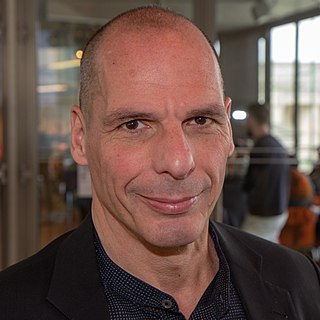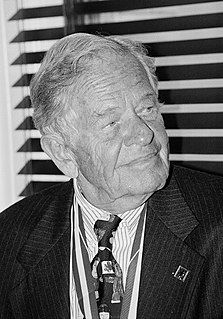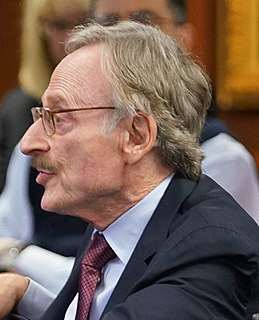A Quote by Hunter Lovins
If we use resources productively and take to heart the lessons learned from coping with the energy crisis, we face a future confronted only, as Pogo, once said, by insurmountable opportunities. The many crises facing us should be seen, then, not as threats, but as chances to remake the future so it serves all beings.
Related Quotes
I feel many problems that we are facing, are man-made problems, we have too much emphasis on this secondary thing, forgetting our foundation. At foundation, we are the same human being and we are sharing the same planet. Six billion human beings' future is my future and my future is never separate from the future of six billion human beings.
The energy crisis has not yet overwhelmed us, but it will if we do not act quickly. It's a problem that we will not be able to solve in the next few years, and it's likely to get progressively worse through the rest of this century. We must not be selfish or timid if we hope to have a decent world for our children and grandchildren. We simply must balance our demand for energy with our rapidly shrinking resources. By acting now we can control our future instead of letting the future control us.
The opportunities and threats existing in any situation always exceed the resources needed to exploit the opportunities or avoid the threats. Thus, strategy is essentially a problem of allocating resources. If strategy is to be successful, it must allocate superior resources against a decisive opportunity.
For decades we have been living lives of abundance, with little regard for our natural resources or global health. But we are now facing hard choices in our energy policy. Future generations - my children and grandchildren, along with yours - will have to live with the decisions we make today. And so it is time for us to make some tough and - hopefully - smart choices regarding our energy use and production before it is too late.
Regular crises perpetuate the past by reinvigorating cycles which started long ago. In contrast, (capital-C) Crises are the past's death knell. They function like laboratories in which the future is incubated. They have given us agriculture and the industrial revolution, technology and the labour contract, killer germs and antibiotics. Once they strike, the past ceases to be a reliable predictor of the future and a brave new world is born.
To be hopeful in bad times is based on the fact that human history is not only of cruelty, but also of compassion, sacrifice, courage, kindness. If we see only the worst, it destroys our capacity to do something. If we remember those times and places where people have behaved magnificently, this gives us the energy to act. And if we do act, in however small a way, we don't have to wait for some grand Utopian future. The future is an infinite succession of presents, and to live now as we think human beings should live, in defiance of all that is bad around us, is itself a marvelous victory.
A family's responses to crisis or to a new situation mirror those of a child. That is to say, the way a small child deals with a new challenge (for instance, learning to walk) has certain predictable stages: regression, anxiety, mastery, new energy, growth, and feedback for future achievement. These stages can also be seen in adults coping with new life events, whether positive or negative.
Our past cannot be changed, and to be preoccupied with it is inefficient in time and effort. Likewise, by fretting over the future, we only exhaust ourselves, making us less able to effectively respond when the future is actually upon us. By worrying about a mishap that may or may not take place, we're forced to undergo the event twice-once when imagining it and once again if and when we actually experience it.
This is our one and only chance at mortal life-here and now. The longer we live, the greater is our realization that it is brief. Opportunities come, and then they are gone. I believe that among the greatest lessons we are to learn in this short sojourn upon the earth are lessons that help us distinguish between what is important and what is not. I plead with you not to let those most important things pass you by. As you plan for that illusive, nonexistent future when you will have time to do all that you want to do. Instead, find you in the journey now.
Anyone interested in the past, present, or future of banking and financial crises should read The Bankers' New Clothes. Admati and Hellwig provide a forceful and accessible analysis of the recent financial crisis and offer proposals to prevent future financial failures. While controversial, these proposals--whether you agree or disagree with them--will force you to think through the problems and solutions.

































